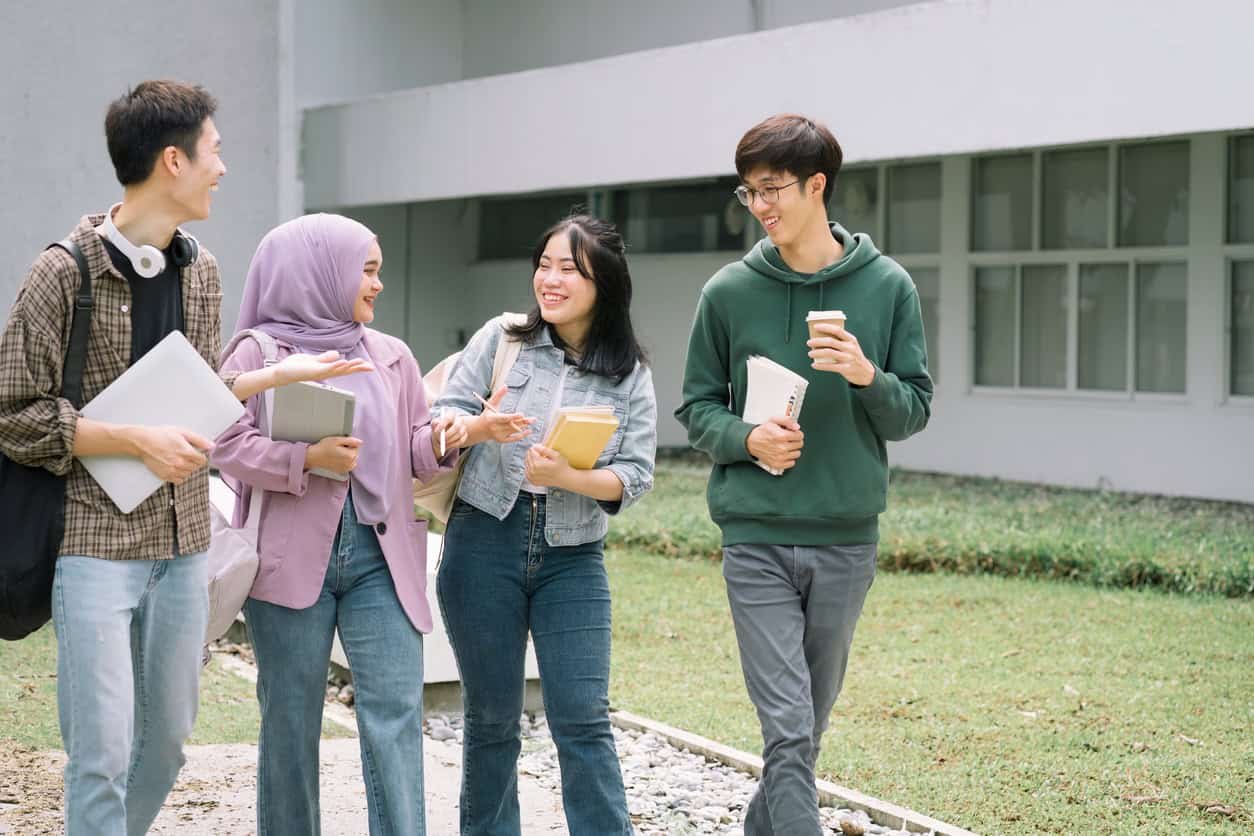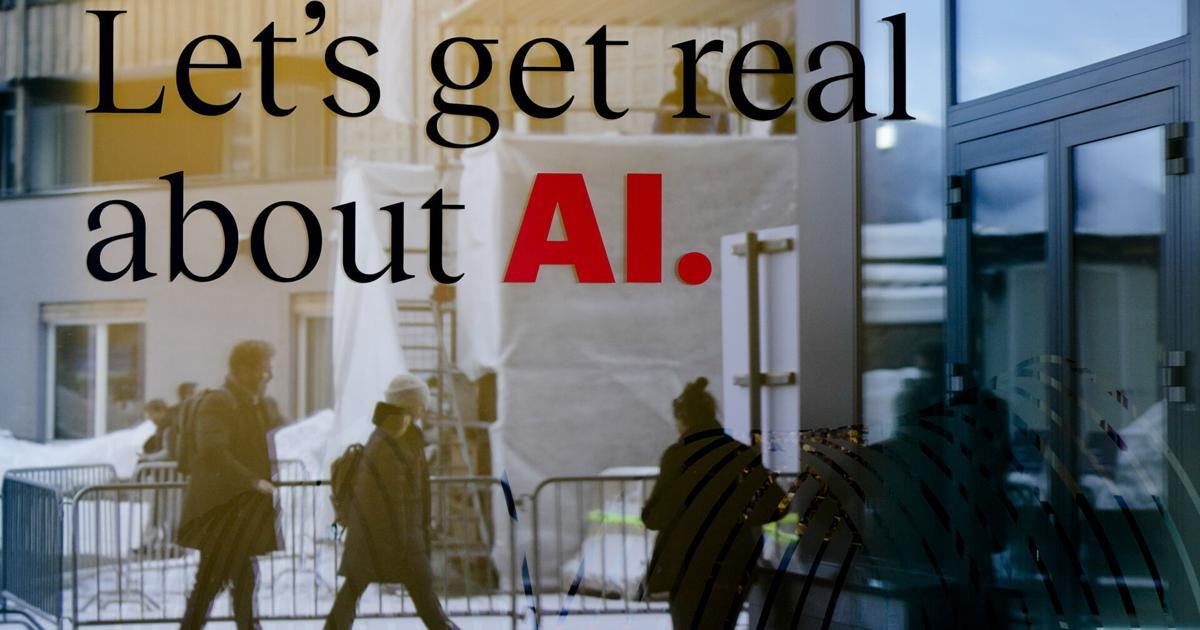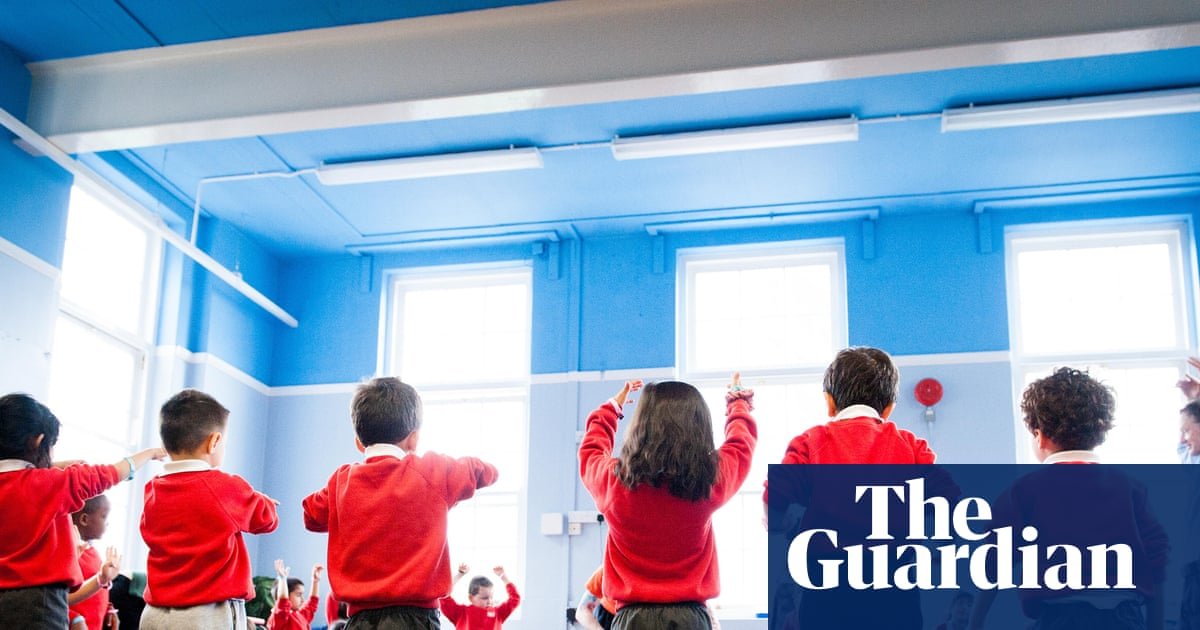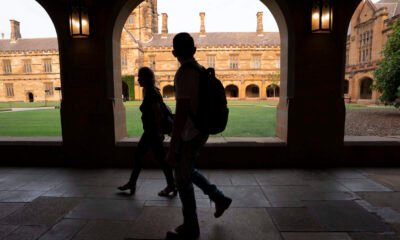Education
Record number of Chinese undergrads applying to UK unis

Some 33,870 Chinese students applied to UK universities and colleges via UCAS by the June cutoff this year, up from 30,860 in 2024. It marks a record number of Chinese students applying to institutions in this way.
Other notable year-on-year increases can be seen in applicants from Ireland (up 15%), Nigeria (up 23%) and the US (up 14%) which have contributed to a slight overall increase in international applicants using UCAS, the data shows.
The total number of undergraduate international applicants using the UCAS system was at 138,460 by June 2025 – up 2.2% on June 2024 numbers.
But while the number of offers made to international graduates outside of the EU continues to grow – up 10.7% year on year – this cohort of students was the least likely to be made an offer, at 63.5%.
“The June data is most useful for telling us what has happened since January,” explained Mark Corver, founder and former MD of dataHE, who suggested that one area of disappointment for UK universities will be continuing weak demand from the EU once “special case” Ireland is taken out, with young applicants from the EU fractionally lower than last June.
“Universities value EU students for diversity in their international intakes and the lower geopolitical and distance related risks. They would have liked to have seen growth here but will be pleased that the fall is the smallest yet since EU students fell into the international fee category,” said Corver.
However, the data released today does not offer the full picture, with UCAS pointing out that its data only shows a partial view of undergraduate international admissions in the UK.
With 154,000 Chinese students studying in the UK in 2022/23, the British Universities’ China Association (BUCA) said the 10% rise in Chinese undergraduate applications via UCAS reflects “sustained interest in UK higher education”. Several key drivers underpin this demand, including domestic academic pressures and tighter immigration rules in other study destinations such as the US, Canada and Australia.
“More families are opting out of the highly competitive public high school system in favour of international schools, which provide a less stressful environment. These students are ineligible to sit the Gaokao and must pursue undergraduate education abroad,” the association’s executive committee explained to The PIE.
“The China market continues to play a pivotal role in international recruitment strategies for UK universities. However, changing student preferences, increasing global competition, and evolving regulatory frameworks are reshaping the landscape. A data-led, agile approach is essential to sustaining engagement and growth.”
And BUCA noted that while rising UCAS applications are encouraging, they do not guarantee conversion.
“Chinese students frequently apply to multiple countries. Rising tuition fees and living costs in the UK, coupled with increasing financial caution among families, also influence final decisions. Therefore, institutions must balance optimism with realistic financial planning.”
Chinese students frequently apply to multiple countries… institutions must balance optimism with realistic financial planning
British Universities’ China Association
With numbers from the US also attracting attention, Corver weighed in on the notion that the new Trump administration has made staying at home less attractive for US students.
“The number of young applicants is up 15%, a high but not exceptional year-on-year increase. But the growth in applicants over the past six months has been very normal, a bit below average in fact, which is perhaps not what you would expect to see if there was strong behavioural change,” he explained.
According to Corver, overall the June data is “a reminder that international demand (and recruitment) to full-time undergraduate through UCAS has been both growing, and doing so in a low variance way”.
“This likely reflects that the three year commitment and substantial fees means that the quality and suitability of the course are the primary factors. Universities know this, and many I know are looking to increase their share of international recruitment to these programs rather than the easier, but much more volatile, PGT courses,” he said.
“The large increases in offer rates this year are one sign of this, but we will have to wait to see if applicants follow through and take up the places as the cycle concludes.”
More than two million offers were made to people applying for UK undergraduate courses starting this September – 74,000 more than last year, a 9% increase since 2023. International students saw the biggest rise in offer rates, with 64% of their university applications being successful, up from 59% last year and 55% in 2023.
Education
AI tutor, for schools and education, without human intelligence targets?

The [September 1, 2025] Labor Day was a question of what should become of education, if AI can operate intelligently, to do aspects of productive work? What is the missing piece to learn for the future, in the era of AI? How much potential do AI tutors hold, specifically, against what excellent human instructors already provide?
The biggest problem in education is the unknown — how human intelligence works. The promise of revolutionizing learning is less about another trend than what is understood as human intelligence and how it should guide learning.
Learning has subsumed a ton of [guess] interventions over decades, with explorations for improved outcomes. Yet, the quality of knowledge as a transcendent property has eluded many. The barriers to the transformational capacity of education are closely aligned with human intelligence, much more than facilities or instructors’ questions.
It is not even progress, at this point, to assume that artificial intelligence can augment learning without knowing how human intelligence works. The human intelligence that AI would train is the same human intelligence that would compete with AI for work? What should humans be learning for now [that the subtraction of whatever AI can do or answer, from what humans can do, in several important tasks, leaves the thing a lot less valuable — as an impact on labor]?
Learning Questions
How does learning adapt to significant problem-solving? What are the techniques to persist in learning complex stuff that may hold important solutions? How can learning be designed to match patterns to answer the unsolved? If an individual is learning what AI already knows, how should that learning be structured to out-compete AI?
Will it ever be possible to personalize learning for everyone?
AI Tutor
For now, AI tutors, AI schools, AI education, or AI learning are not offering anything beyond what is still possible with human instructors. What education is seeking in this era, that AI tutors can optimize for, is pathway displays for memory and intelligence in the brain, to track, almost in parallel, the processes of understanding, recall, creativity, innovation, and expertise, to increase the chances for those.
Simply, what an AI tutor should solve is what a human instructor cannot yet solve: which is the likelihood to target learning, for navigation in the brain, towards advancing humanity. Already, all AI chatbots can answer questions, with several examples — plus simplicity. Still, it is not like grasping, for all, is now straightforward. This is saying that the problem that exists continues to linger, even if mitigated by consumer AI.
Human Intelligence
Any AI tutor program that can develop or show a model of how human intelligence works, to prospect learning [for relays] in the brain would transform education — this century. Simply, show a concept of how human intelligence works, and use that to tailor lessons for higher-order results. Already, human instructors can provide regular training, but what would make a difference, for AI, is to shape human intelligence to withstand the uncertainties that AI holds for the future.
AI tutor in schools can explore theoretical neuroscience, developing models for many aspects of learning. Memory, conceptually, is obtained in destinations in the brain, but intelligence [which is the use of memory] are navigations [of information] summaries across memory areas. Rote memorization, for example, is the making of new paths between memory locations, so that the paths are available for direct relays subsequently, resulting in recall. Problem-solving could be the overlay of two memory locations, so that their differences, rather than contrast, are made similar, opening up possibilities for answers.
The opportunity for AI tutor in education is not to do what human instructors can do or to assume it will simply make things easier when the [human intelligence] question remains unanswered, and AI would be able to do aspects of several jobs, if that is the learning objective. How does human intelligence work is how to restart the education project — now that AI is ascendant.
ChatGPT Edu
There is a recent [August 28, 2025] announcement by Indiana University, IU strengthens national leadership in AI innovation with ChatGPT Edu rollout, stating that, “Indiana University is expanding its robust artificial intelligence offerings with OpenAI by providing access to ChatGPT Edu, a version built specifically for higher education. ChatGPT Edu offers the world’s most advanced AI tools for learning, teaching, and research.”
“In providing access to all 120,000 students, faculty, and staff, IU will be the second-largest ChatGPT Edu rollout of all time for OpenAI, demonstrating IU’s national leadership in higher education innovation and underscoring its commitment to responsibly integrating AI across its campuses while preparing a future-ready workforce.”
“IU faculty and staff can request institutional access beginning Sept. 2, with student access launching Jan. 1 [2026]. The deployment of ChatGPT Edu is one of many ways IU is integrating AI across the academic experience.”
“In August, IU launched a new, free GenAI 101 course that serves as a foundational program introducing the IU community to generative AI concepts, applications, and responsible-use practices.”
“Together, GenAI 101, ChatGPT Edu, and IU’s expanding suite of AI services ensure that faculty, staff, and students are not only equipped with powerful AI tools but also prepared to use them effectively and ethically.”
This article was written for WHN by David Stephen, who currently does research in conceptual brain science with a focus on the electrical and chemical signals for how they mechanize the human mind, with implications for mental health, disorders, neurotechnology, consciousness, learning, artificial intelligence, and nurture. He was a visiting scholar in medical entomology at the University of Illinois at Urbana-Champaign, IL. He did computer vision research at Rovira i Virgili University, Tarragona.
As with anything you read on the internet, this article should not be construed as medical advice; please talk to your doctor or primary care provider before changing your wellness routine. WHN neither agrees nor disagrees with any of the materials posted. This article is not intended to provide a medical diagnosis, recommendation, treatment, or endorsement.
Opinion Disclaimer: The views and opinions expressed in this article are those of the author and do not necessarily reflect the official policy of WHN/A4M. Any content provided by guest authors is of their own opinion and is not intended to malign any religion, ethnic group, club, organization, company, individual, or anyone or anything else. These statements have not been evaluated by the Food and Drug Administration.
Education
SDOC talks AI in schools – upstatetoday.com

SDOC talks AI in schools upstatetoday.com
Source link
Education
Special needs overhaul risks becoming ‘welfare reforms mark 2’, IFS finds | Special educational needs

Special needs reforms for children in England could turn into “welfare reforms mark 2” unless the government can convince parents that it is not aiming to save money, according to a report by the Institute for Fiscal Studies.
The thinktank said any changes to the current system of education, health and care plans (EHCPs), which mandate tailored support for children with special needs, will be highly controversial among parents, but said reform was “long overdue” as the number of EHCPs issued has ballooned by 80% since 2018.
About one in 20 school-age children and young people in England currently have an EHCP.
Earlier this year the government was forced to U-turn on changes to disability and health-related benefits after a huge backbench MPs’ rebellion, and the Institute for Fiscal Studies (IFS) suggests that botching reforms to special educational needs and disability (Send) provision could provoke a similar backlash.
In a briefing entitled England’s Send Crisis, the IFS said: “Any reforms are likely to generate controversy. If the focus is on reducing legal rights to cut short-term costs, this could easily turn into welfare reforms mark 2.
“To avoid this, the government needs to be candid: the current system is failing many of the children it is meant to support, despite billions in additional spending and a complex framework of legal entitlements.
“A successful reform should articulate a clear vision for a system that supports all children while delivering better value for money.”
Luke Sibieta, the co-author of the briefing, said the success of any reforms hinged on the government’s presentation of the white paper it is preparing to publish later this year.
“If the focus of what’s in the white paper, and how it is sold, is all about saving money and reducing burdens, then it’s very hard to see how this policy will go through.
“But if it is about providing a better quality of service, or providing access to support earlier, in an easier and better way, then I can see how the policy can be successful,” Sibieta said. “When you talk to parents, no one actually likes the EHCP process.”
Bridget Phillipson, the education secretary, also faces a struggle to convince the Treasury that more spending is needed, especially to build more dedicated special schools, as well as dedicated Send units within mainstream schools.
The IFS said creating more state-funded special schools was an “obvious solution” that would allow local authorities to avoid using more expensive private special schools, where the average cost for each pupil is £62,000 a year compared with £24,000 in the state sector.
The number of pupils with EHCPs at private special schools has tripled since 2016, from 10,000 to 30,000, with that increase alone accounting for nearly £1bn of the £4bn annual rise in high-needs spending over recent years.
The IFS was also highly critical of EHCPs, legal documents in which local authorities and parents agree on the additional support for children with special needs.
“EHCPs are meant to guarantee help. However, you cannot magic quality into existence by writing it on a legal document,” the report notes.
“As a result, the quality of current provision is patchy. Many children are pulled out of lessons for support from poorly trained teaching assistants, missing time with qualified teachers. We have almost no way of judging whether the billions in extra funding represent value for money.”
A Department for Education spokesperson said: “This government inherited a Send system left on its knees – which is why we are listening closely to parents as we work to improve experiences and outcomes for all children with Send, wherever they are in the country. Our starting point will always be improving support for children.”
-

 Business2 weeks ago
Business2 weeks agoThe Guardian view on Trump and the Fed: independence is no substitute for accountability | Editorial
-
Tools & Platforms1 month ago
Building Trust in Military AI Starts with Opening the Black Box – War on the Rocks
-

 Ethics & Policy2 months ago
Ethics & Policy2 months agoSDAIA Supports Saudi Arabia’s Leadership in Shaping Global AI Ethics, Policy, and Research – وكالة الأنباء السعودية
-

 Events & Conferences4 months ago
Events & Conferences4 months agoJourney to 1000 models: Scaling Instagram’s recommendation system
-

 Jobs & Careers2 months ago
Jobs & Careers2 months agoMumbai-based Perplexity Alternative Has 60k+ Users Without Funding
-

 Podcasts & Talks2 months ago
Podcasts & Talks2 months agoHappy 4th of July! 🎆 Made with Veo 3 in Gemini
-

 Education2 months ago
Education2 months agoMacron says UK and France have duty to tackle illegal migration ‘with humanity, solidarity and firmness’ – UK politics live | Politics
-

 Education2 months ago
Education2 months agoVEX Robotics launches AI-powered classroom robotics system
-

 Funding & Business2 months ago
Funding & Business2 months agoKayak and Expedia race to build AI travel agents that turn social posts into itineraries
-

 Podcasts & Talks2 months ago
Podcasts & Talks2 months agoOpenAI 🤝 @teamganassi





















